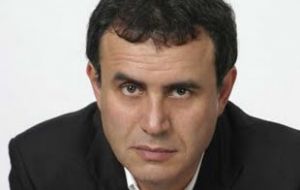MercoPress. South Atlantic News Agency
Leading economist Roubini warns of “U shaped” or “W shaped” recovery
 Economic growth to remain low for “two to three” years anticipated Roubini
Economic growth to remain low for “two to three” years anticipated Roubini Leading economist Nouriel Roubini who predicted the global financial crisis said Friday in Italy that he expects a slow recovery for advanced economies, but emerging economies may experience a quicker more robust growth.
The New York University economist added he doesn't expect a “V-shaped” recovery, the hoped-for fast bounce back. Instead, he predicts a slower, “U-shape” economic recovery with the risk of a “double-dip” recession “W shape” if governments don't time the end of stimulus packages correctly.
“I believe that the basic scenario is going to be one of a 'U-shaped' economic recovery where growth is going to remain below trend ... especially for the advanced economies, for at least two or three years,” he said at a news conference on the sidelines of the Ambrosetti Forum on Italy's Lake Como.
“Within that 'U' scenario I also see a small probability - but a rising probability - that if we don't get the exit strategy right we could end up with a relapse of growth and therefore with a double-dip recession” he said.
Roubini said that “it is very tough not to make a policy mistake” between the opposite risks of ending the stimulus too soon - and sending the economy back into recession -or too late, which could mean unsustainable budget deficits. Of the two, he said, waiting too long seemed the hardest one to avert.
“Whether that's highly likely or not, I don't know. I think it certainly is a rising risk” added the economist. Amid the cautious optimism being spread by some politicians and economy, Roubini warned against celebrating the end of the economic crisis too soon.
“There is now this belief that the crisis is over, the conditions in financial markets are fine, that banks are doing OK,” he said. ”I think too many people are hopeful that everything is fine and unfortunately the road ahead is going to be at best bumpy, if not worse than that”, he warned.
Roubini underlined he was concerned that economies with high savings ratios such as China, Japan and Germany could or would not boost world consumption sufficiently to compensate any fall in demand from those countries which “spend in excess” such as the United States and the United Kingdom.
“If US consumers spend less, then for the global economy to expand at its potential, other countries with high savings ratio would have to save less and consume more”.
He added his concern was that “if for different reasons, countries such as China and other Asian emerging markets, Japan or Germany does not have a significant increase in their consumption rate and a reduction in their savings ratio”.
Finally he underlined that Central banks should pay more attention to asset prices when deciding interest rate policies and that US Federal Reserve president Ben Bernanke, “should follow the same path”.




Top Comments
Disclaimer & comment rulesCommenting for this story is now closed.
If you have a Facebook account, become a fan and comment on our Facebook Page!